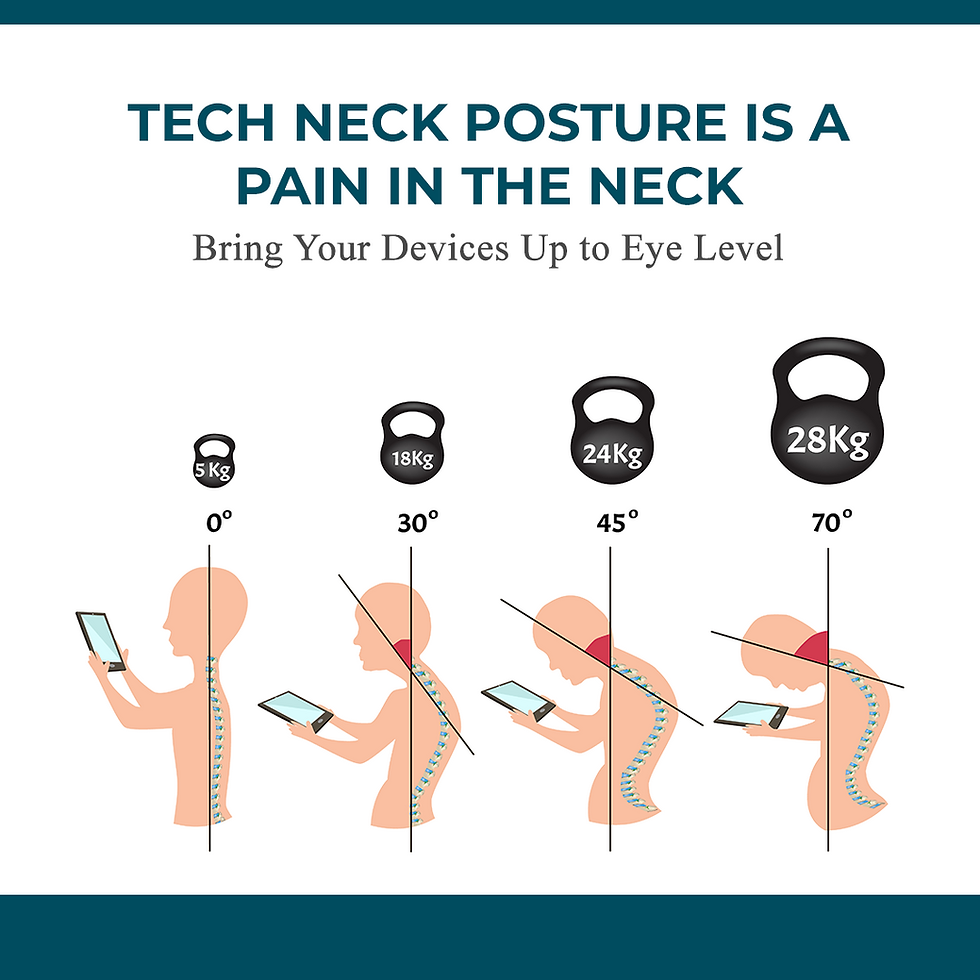Tech Neck Posture: What is that?
- drsonja
- Jan 31, 2021
- 3 min read
We are undoubtedly living in a technologically driven society, where the dependence on digital devices is significant. Individuals are not only spending a substantial amount of time hypnotized by screens but are interacting with technology in an extremely unhealthy manner. While technology has become an integral part of our lives and is useful in so many ways, it has also impacted the quality of our lives and our health standards. This has contributed to the increase in postural decline which is a significant public health concern.

So What Is Tech Neck Posture?
The term ‘Tech Neck Posture’ refers to the negative postural impact that technology has on an individual. Tech Neck Posture describes how looking down at devices with the neck flexed forward at varying angles changes the amount of pressure compressing the neck. This flexed forward position of the neck, combined with gravity, has a much greater implication than one expects. Hansraj (2015) explains that when looking down at a device the amount of pressure on your neck significantly increases, for example an adults head is on average 5kg (11 lbs) but when tilted at a 60 degree angle, the weight of the head increases to 30kg (66 lbs). This creates a great amount of pressure on the neck which causes headaches, migraines, neck pain, respiration disorders, shoulder tension and many other symptoms.

How to Identify Tech Neck Posture
So how do you know if you or your family members are suffering from Tech Neck Posture?
Tech Neck Posture is important to identify, not only in adults but more so in children in order to take the necessary preventative steps to ensure good posture and good health. Tech Neck Posture can be identified through evaluating the way your friends or family members interact with mobile devices. This evaluation can be done through making use of the various severity stages:
Stage 1: Proper Tech Neck Posture
Ears are aligned over the shoulders
Eyes are looking forwards instead of looking down
Back is straight
Child is standing up
Stage 2: Standing & Slumped Tech Neck Posture
Ears are in front of the shoulders
Head is dropped down
Eyes are dropped down
Shoulders and upper back are rounded forward
Child is standing
Stage 3: C-Spine Tech Neck Posture
Ears are in front of the shoulders
Head is dropped down
Eyes are looking down
Shoulders and upper back are rounded forward
C-Shaped spinal curvature
Child is seated
Tips on How to Prevent or Reverse Tech Neck Posture
So what now?
Once Tech Neck Posture has been identified it’s important to take the required steps in reversing or preventing it from happening. Here are some tips on how to prevent or reverse Tech Neck Posture:
Reduce the amount of time spent on your mobile devices and look up more.
Through limiting the amount of time spent on mobile devices, you are able to reduce the amount of strain and pressure that is placed on your neck.
When you reduce the amount of time spent on your device you are also more likely to look up more which further reduces the likelihood of developing Tech Neck Posture.
2. Retract your neck back.
Retract your neck and chin back so that your ears are aligned over your shoulders in order to contribute and ensure proper posture.
3. Ensure to adjust and keep your devices at eye level.
We tend to look down when we are interacting with our devices, so try bringing your mobile devices up to eye level. By doing so you are able to keep your head up straight and alleviate pressure from your neck.
Due to the technologically driven society that we live in and the fact that technology is unavoidable, it is extremely important to be ‘pro-health’ rather than ‘anti-tech’. This essentially promotes interacting with technology in the healthiest way possible. Therefore, it’s important that we are aware and can identify Tech Neck Posture in order to take the necessary steps in ensuring to use technology in a way which helps reverse or prevents developing Tech Neck Posture.





Comments